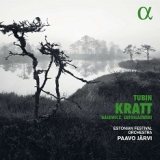Paavo Järvi und das Estonian Festival Orchestra präsentieren Musik des estnischen Komponisten Eduard Tubin (1905-1982) und eröffnen das Programm mit einer farbigen und unterhaltsamen Suite aus dem Ballett Kratt (Kobold).
Die Suite aus dem Ballett Kratt (1961) beruht auf Tubins gleichnamigem Ballett. Die Idee zu diesem Werk entstand 1938 nach seiner Rückkehr aus Budapest, wo er Zoltan Kodaly seine Kompositionen vorgelegt hatte. Kodaly empfahl ihm, der Verwendung von Volksweisen größere Aufmerksamkeit zu widmen.
Tubin ließ sich Material aus dem estnischen Folklorearchiv kommen und wählte dreißig Volkslieder und Instrumentalstücke als Grundlage für das Ballett aus.
In der estnischen Mythologie wird ein Kratt (Kobold) von Menschen erschaffen, aber vom Teufel zum Leben erweckt. Beeinflusst von bösen Mächten fliegt der Kratt durch die Luft und hinterlässt eine glühende Feuerspur, während er für seinen Herrn Schätze anhäuft. Doch im Gegenzug verkauft der Meister seine Seele an den Teufel.
Die Uraufführung von Kratt fand am 24. Februar 1944 in Tallinn statt, am Gründungstag der estnischen Republik. Das Ballett wurde nur sechsmal aufgeführt, bevor das Nationaloper Estonia am 9. März bei einem Bombenangriff der russischen Sowjetarmee zerstört wurde, als Russland Estland annektierte.
Die Partitur fiel dem Feuer zum Opfer, aber die Instrumentalstimmen und der Klavierauszug waren in Sicherheit. Tubin nahm sie mit, als er 1944 nach Schweden floh, und fertigte eine neue Partitur an. Im Jahr 1961 komponierte er im Auftrag des Schwedischen Radiosinfonieorchesters die Suite aus dem Ballett.
Von Tubin ist auch die klanglich nicht weniger reizvolle Musik für Streicher zu hören, die Paavo Järvi ausdrucksvoll spielen lässt.
Musique funèbre des polnischen Komponisten Witold Lutoslawski (1913-1994) wurde in Erinnerung an Gedenken an Bela Bartok komponiert. Es ist eher eine Hommage als ein Lamento oder eine Elegie, und Järvi hütet sich vor jeglicher Sentimentalität.
Sehr spannend ist das in den Ecksätzen mit federndem Schwung, im Andante mit sublimer Zartheit gespielte neoklassische Konzert für Streichorchester der polnischen Komponistin Grazyna Bacewicz.
Paavo Järvi and the Estonian Festival Orchestra present music by Estonian composer Eduard Tubin (1905-1982), opening the program with a colorful and entertaining suite from the ballet Kratt (Goblin).
The suite from the ballet Kratt (1961) is based on Tubin’s ballet of the same name. The idea for this work was born in 1938 after his return from Budapest, where he had presented his compositions to Zoltan Kodaly. Kodaly recommended that he pay greater attention to the use of folk tunes.
Tubin obtained material from the Estonian folklore archive and selected thirty folk songs and instrumental pieces as the basis for the ballet.
In Estonian mythology, a kratt (goblin) is created by humans but brought to life by the devil. Influenced by evil forces, the Kratt flies through the air, leaving behind a glowing trail of fire as he accumulates treasures for his master. But in return, the master sells his soul to the devil.
The first performance of Kratt took place in Tallinn on February 24, 1944, on the founding day of the Estonian Republic. The ballet was performed only six times before the National Opera Estonia was destroyed on March 9 in a in a bombing raid by the Russian Soviet Army when Russia annexed Estonia.
The score fell victim to the fire, but the instrumental parts and piano reduction were safe. Tubin took them with him when he fled to Sweden in 1944, and made a new score. In 1961, he was commissioned by the Swedish Radio Symphony Orchestra to compose the suite from the ballet.
Tubin’s music for strings, which is no less tonally appealing, can also be heard, and Paavo Järvi lets it be played expressively.
Musique funèbre by Polish composer Witold Lutoslawski (1913-1994) was composed in memory of Bela Bartok. It is more of an homage than a lament or an elegy, and Järvi is wary of any sentimentality.
Very exciting is the neoclassical Concerto for String Orchestra by Polish composer Grazyna Bacewicz, played with bouncy momentum in the outer movements and sublime delicacy in the Andante.






















